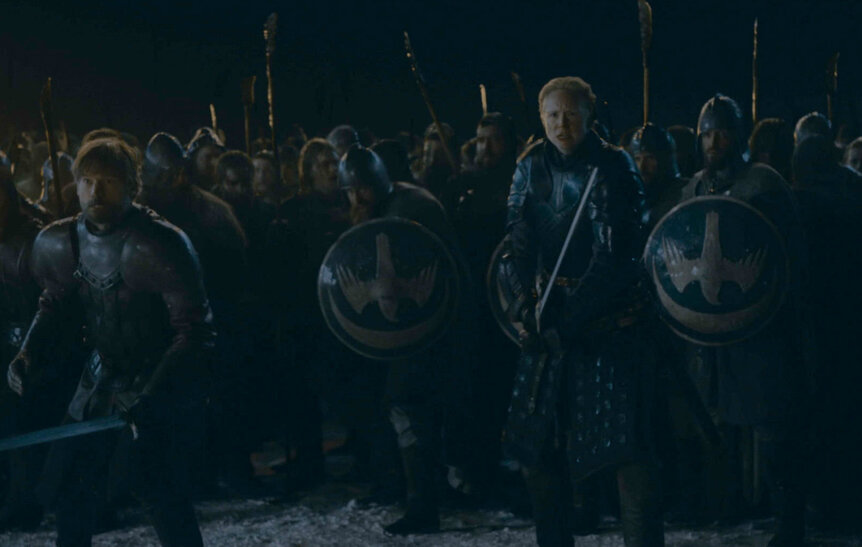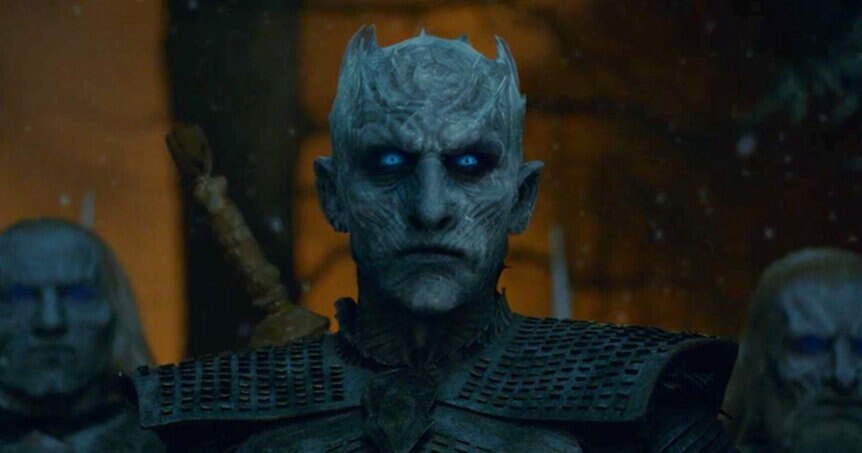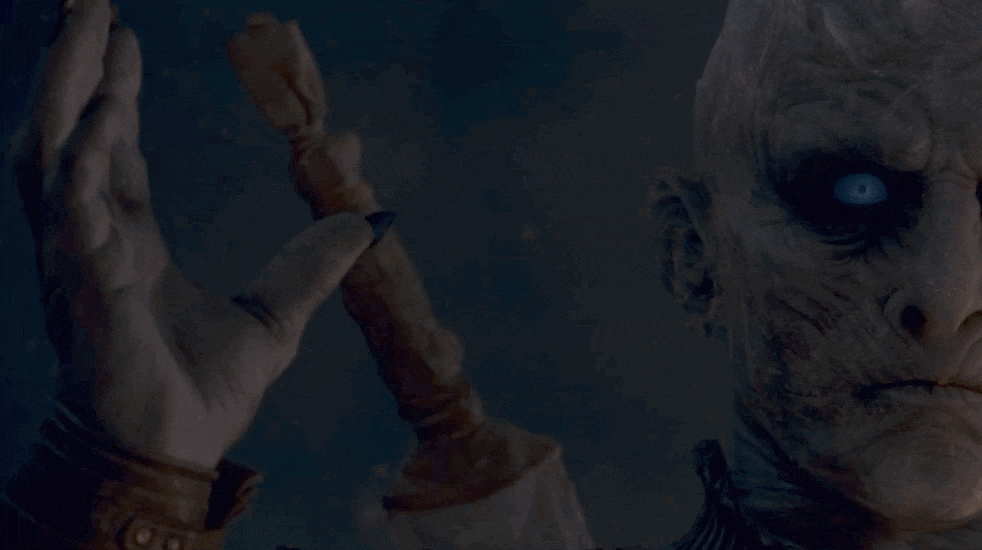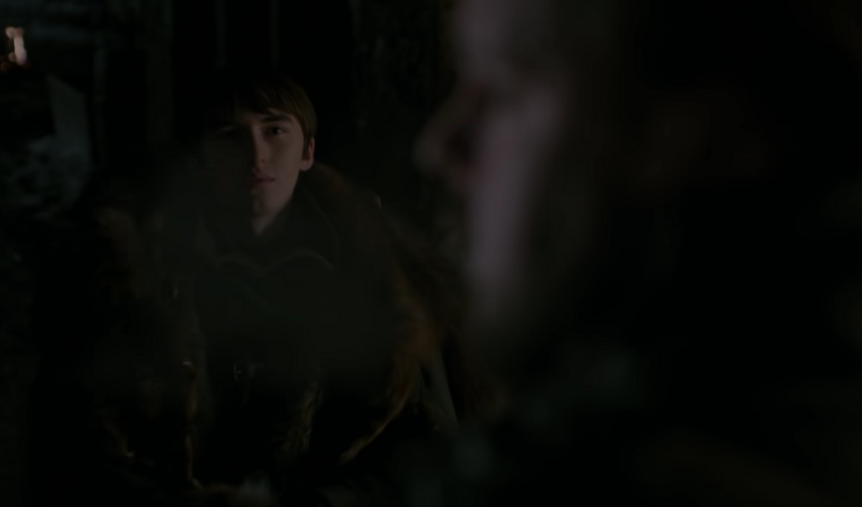Create a free profile to get unlimited access to exclusive videos, sweepstakes, and more!
What are people saying about Game of Thrones' Battle of Winterfell? Hot takes, curated
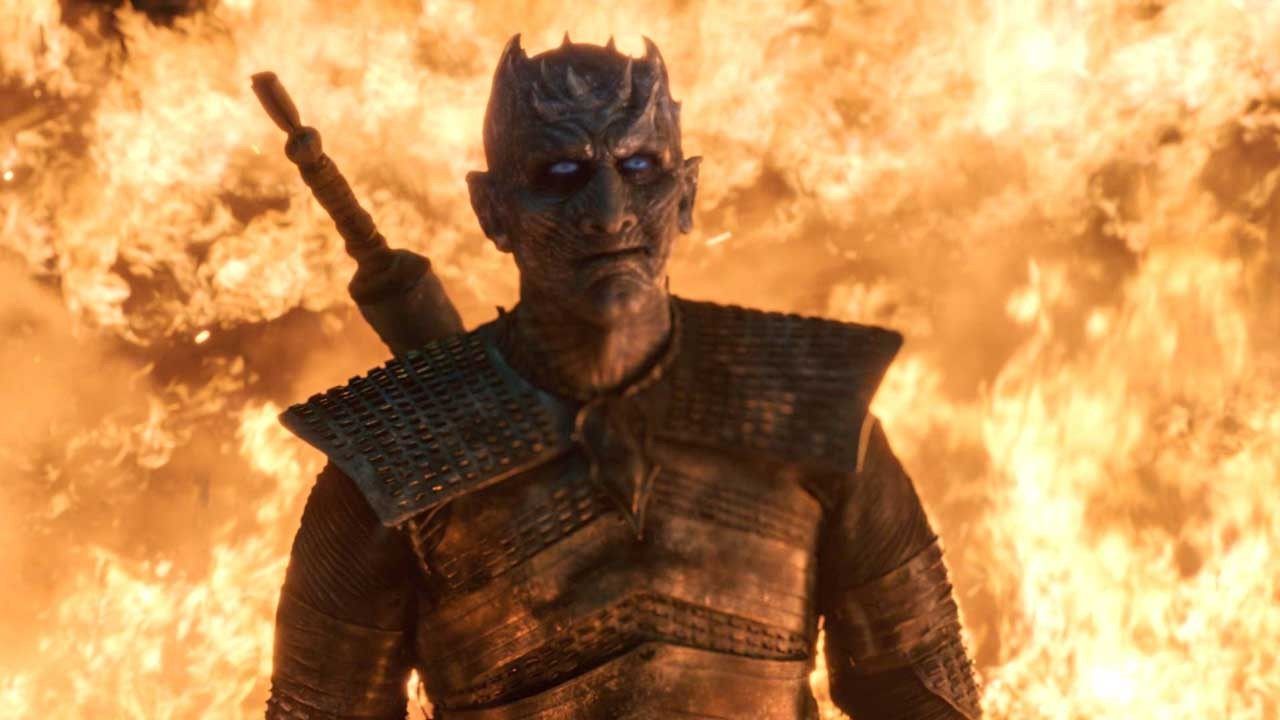
Game of Thrones aired its biggest-ever battle episode on Sunday night, and the supersized episode sparked takes that are hotter than Melisandre's marginally effective flaming barricades.
Episode 3, “The Long Night,” was quite possibly the most hyped-up episode of the entire series. Pretty much every scene from the trailer was leading up to this episode, and there was lots or pre-season talk from HBO about how this was the largest, longest battle ever filmed, for film or TV. It was poised to be the ultimate battle against the army of the dead, and the death count was expected to surpass even Avengers: Endgame, which came out the same weekend.
And yet, the general response to the episode has been tepid at best — with one notable exception. Part of the reason why many Thrones fans didn’t love what they saw on Sunday night was that … they didn’t see anything.
**Spoiler Warning: There are all kinds of spoilers for Game of Thrones' most recent episode in this story**
THE NIGHT WAS TOO DARK AND FULL OF TERRORS
Game of Thrones has gotten darker in later seasons — compare shots of Robert Baratheon and Ned Stark down in the Winterfell crypts in the series premiere to shots of Jon Snow and Daenerys Targaryen down there in the Season 8 premiere.
Insider’s Kim Renfro interviewed cinematographer Robert McLachlan in 2017, and he explained that the trend toward darkness was a result of a trend toward naturalistic lighting and the fact that winter had come to Westeros. Back in earlier seasons, there was lots of backlighting that made even dark castle chambers brighter, making it easier to see what was going on. There wasn’t a “realistic” source for this lighting, though you could argue that it was coming from open windows. But now that Winter is here, it’s too cold for those windows to be open, and candles are expensive in the world of Thrones.
“It really makes it a lot harder for a cinematographer to justify some naturalistic light in there without so overdoing the candles or the fire or what have you,” McLachlan told Insider.
The dim lighting in “The Long Night” was intentional and quite effective at times. The shot of all the flaming Dothraki swords extinguishing in the distance was chilling, and Melisandre's flames really stood out. Even if there was intentionality behind obscuring most of the action, that doesn’t mean it worked, as many viewers noted.
Slate noted that there are technological reasons why TV has been getting darker, even as the devices viewers use to watch TV are getting worse at handling dim lighting. It’s not just you — it’s your TV or laptop screen.
Nothing about Game of Thrones happens by accident. Everything is an artistic or stylistic choice, and the showrunners and cinematographers made the choice to make the battle dark and disorienting to be realistic. But if that realism is getting in the way of people enjoying what’s happening, is it really worth it?
Compare “The Long Night” to the Battle of Helm’s Deep in The Two Towers. An anecdote that’s understandably making the rounds online after the episode explains the late Lord of the Rings cinematographer Andrew Lesnie’s approach to lighting. When Sean Astin once asked Lesnie where the light was coming from on a set that “realistically” should have been dark, Lesnie replied, “Same place as the music.”
It’s unfortunate that many viewers couldn’t appreciate a blockbuster episode of a show with a zombie dragon because it was too realistic, yet complaints about the darkness seemed to be as loud — if not louder — than emotional reactions to the episode. Perhaps that’s because ...
WHAT IS DEAD MAY NEVER DIE (ESPECIALLY IF YOU’RE A MAIN CHARACTER)
Well, a bunch of people died. In order, the episode saw the end of Dolorous Edd, Lyanna Mormont, Beric Dondarrion, Theon Greyjoy, the Night King, Ser Jorah Mormont, and Melisandre. That’s not an insignificant list of casualties, but as The Ringer’s Alison Herman noted, Game of Thrones has “lost its ruthlessness.”
“As the show grew closer to its predetermined conclusion, the plot armor around its core cast only seemed to thicken, in stark contrast with the body count that contributed to the story’s appeal,” Herman writes, noting that the fourth-to-last, giant battle episode seemed like a perfect opportunity for Thrones to start killing the audience’s darlings once more.
And yet, that didn’t happen. For all the realism of the dim lighting, it strained credulity that essentially the only survivors of this deadly battle were named characters. The army of the dead could effortlessly overrun a Dothraki horde and legions of Unsullied, but Ser Davos, Pod, Jaime, and the rest of the familiar faces could hold out against scores of wights until the end.
The way that the Dothraki and Unsullied were disposed of didn’t sit well with many viewers. The Dothraki and Unsullied both primarily consist of non-white characters, compared to most of the Westerosi soldiers. So the implication of sending them off to disposable deaths without much concern was unfortunate, as people noted on Twitter.
GOOD NIGHT, NIGHT KING
The most unexpected part of the episode, the part that had fans screaming on their couches, was the Night King’s unexpected death with three episodes left to go in the show. Fans were freaking out that Arya, not Jon or Dany, did the deed (more on that later), but also at the fact that the Night King, the series’ ultimate Big Bad, was dead.
“If you had asked me before Season 8 started whether the Night King would die in episode three, I don’t know that I would have put my money on such a thing happening, even though it’s very George R.R. Martin to set up a massive, existential threat and then get rid of it with several chapters to go in your final book,” writes Vox’s Todd VanDerWerff.
Plot twists like this are indeed part of the series’ DNA. (Remember when we thought Ned Stark was the protagonist? Or when we thought Robb Stark had a future?) Many critics are glad to see Game of Thrones return to the medieval politics that made the first seasons so dramatic before the walking dead hogged the spotlight, but the Night King’s unexpectedly quick demise rang hollow for others.
“The Night King and his army were a fundamentally empty threat, capable of being erased in one fell swoop and without any kind of purpose beyond their existence,” The AV Club’s Myles McNutt wrote. “This is yet another large-scale battle, similar to the ‘Battle of the Bastards,’ where the moment you start getting your breath back and begin taking stock of what happened, the spell of the immersion breaks and you realize that there’s not as much ‘there’ there as you were hoping for.”
Back at The Ringer, Zach Kram had a similar take on the end of the White Walker menace.
“Now they’re gone, erased in a cool but unearned climax,” he writes. “Arya’s winning blow is symbolic of the entire White Walker arc on the show: often visually stunning, at times mighty surprising, but ultimately unfulfilling, yielding even more unanswered questions in its aftermath."
A GIRL IS ARYA FREAKIN' STARK
So, there was a lot about “The Long Night” that people didn’t love. But even if there were some concerns about what it means for the larger story, Arya’s clutch dagger-play was undeniably thrilling in the moment.
Jezebel’s Julianne Escobedo Shepherd shared those concerns about where Thrones goes from here, but all the same, when Arya murked the Night King, “I screamed, I cried, I accidentally bumped my cat in the face with my gesticulation — and it was deeply satisfying that Jon Snow didn’t do it as seemed preordained.”
Lieutenant Olivia Benson was psyched too.
One person who didn’t love that Arya ultimately slew the Night King was, uh, Maisie Williams’ boyfriend.“I told my boyfriend [Arya kills the Night King] and he was like, ‘Mmm, should be Jon though really, shouldn’t it?’” Williams told Entertainment Weekly.
Folks, there are hot takes, but this is a whole other level.
IF THE NIGHT KING IS DEAD, DOES THAT MEAN I’M FREE?
Finally, my personal hot take — not a raging inferno but a warm hearth that comforts my weary spirit — is that the Night King’s death also means the end to one of the most prolific fan theories in all Game of Thrones. Unless Game of Thrones does some truly crazy stuff in the last three episodes, Bran is not the Night King.

